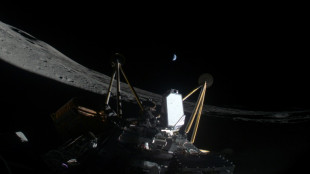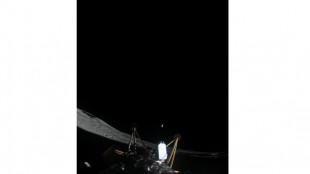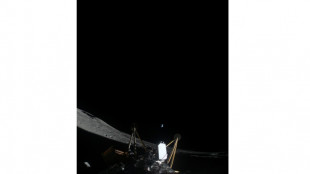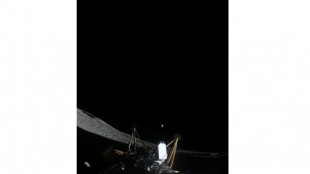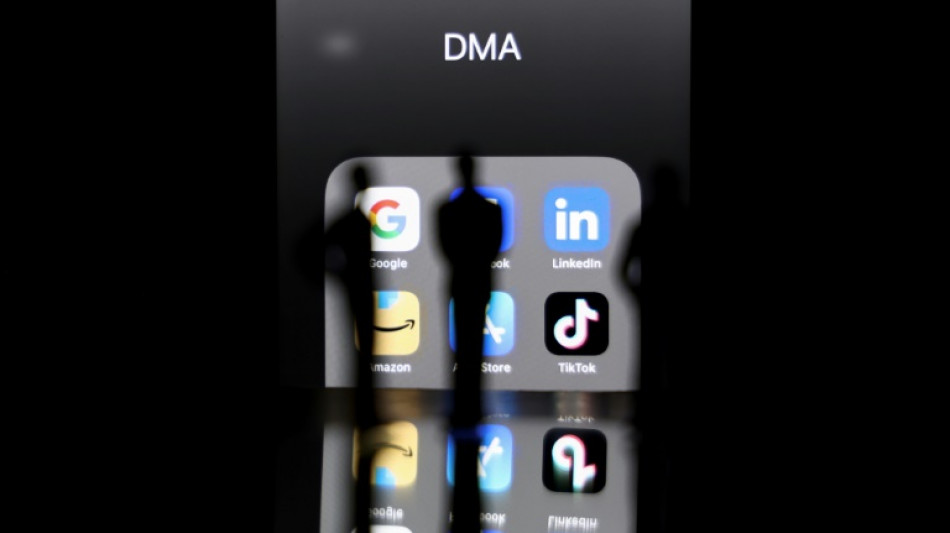
-
 China consumption slump deepens as February prices drop
China consumption slump deepens as February prices drop
-
'Things are different' Djokovic says after another early exit at Indian Wells

-
 Colombian guerillas release hostage security forces
Colombian guerillas release hostage security forces
-
France lose Dupont but Six Nations title on the cards after thrashing Ireland

-
 Phone bans sweep US schools despite skepticism
Phone bans sweep US schools despite skepticism
-
Did Ukraine have to become a partisan US issue?

-
 Djokovic crashes out of Indian Wells opener
Djokovic crashes out of Indian Wells opener
-
Britain's King Charles calls for unity in 'uncertain times'

-
 Morikawa seizes lead at Arnold Palmer after birdie rally
Morikawa seizes lead at Arnold Palmer after birdie rally
-
Alcaraz, Keys breeze into Indian Wells third round

-
 Record-setting Skotheim claims European indoor heptathlon title
Record-setting Skotheim claims European indoor heptathlon title
-
Inter survive Monza scare to extend Serie A lead

-
 Argentina port city 'destroyed' by massive rainstorm, 13 dead
Argentina port city 'destroyed' by massive rainstorm, 13 dead
-
Townsend relishing 'toughest fixture' in France after Scotland's Six Nations win over Wales

-
 Colombian guerillas release hostage security forces: AFP
Colombian guerillas release hostage security forces: AFP
-
Some 200 detained after Istanbul Women's Day march: organisers

-
 Draper sends Brazilian sensation Fonseca packing at Indian Wells
Draper sends Brazilian sensation Fonseca packing at Indian Wells
-
Man with Palestinian flag scales London's Big Ben clock tower

-
 Protesters rally on International Women's Day, fearing far right
Protesters rally on International Women's Day, fearing far right
-
Australian Open champion Keys cruises into Indian Wells 3rd round

-
 Barca Liga match postponed after club doctor dies
Barca Liga match postponed after club doctor dies
-
Alldritt revels in 'historic' French performance to thrash Irish

-
 Watkins haunts Brentford to revive Aston Villa's top-four hopes
Watkins haunts Brentford to revive Aston Villa's top-four hopes
-
Pulisic double rescues AC Milan at lowly Lecce

-
 Mirrors, marble and mud: Desert X returns to California
Mirrors, marble and mud: Desert X returns to California
-
'Grieving': US federal workers thrown into uncertain job market

-
 Slot blast fuelled Liverpool's comeback against Southampton
Slot blast fuelled Liverpool's comeback against Southampton
-
Russell back in the groove as Scotland see off Wales in Six Nations

-
 Remains of murdered Indigenous woman found at Canada landfill
Remains of murdered Indigenous woman found at Canada landfill
-
French throng streets for International Women's Day rallies

-
 Security forces taken hostage by Colombian guerillas released: AFP
Security forces taken hostage by Colombian guerillas released: AFP
-
Pope responding well to pneumonia treatment, Vatican says

-
 France coach Galthie 'angry' at Dupont knee injury
France coach Galthie 'angry' at Dupont knee injury
-
The French were clinical, we were not, says Irish coach Easterby

-
 Sleeping man is struck by train in Peru but survives
Sleeping man is struck by train in Peru but survives
-
Dembele hits double as PSG win ahead of Liverpool return

-
 Bosnia top envoy backs court ruling against separatist laws
Bosnia top envoy backs court ruling against separatist laws
-
Bayern get away with shock loss as Leverkusen fall to defeat

-
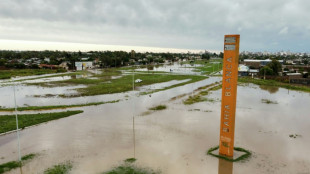 'We have to rebuild a city,' Argentine official says after storm kills 10
'We have to rebuild a city,' Argentine official says after storm kills 10
-
Guardiola urges troubled Man City to fight for Champions League place

-
 Salah fires Liverpool 16 points clear, Forest beat Man City
Salah fires Liverpool 16 points clear, Forest beat Man City
-
Liverpool fight back to go 16 points clear as title moves closer

-
 Hermes celebrates felt at Paris Fashion Week
Hermes celebrates felt at Paris Fashion Week
-
Bayern unpunished for shock loss as Leverkusen fall to defeat

-
 Majestic France destroy Irish Six Nations Grand Slam dreams
Majestic France destroy Irish Six Nations Grand Slam dreams
-
Santner wants New Zealand to keep 'open mind' for Champions Trophy final

-
 Pogacar remounts after fall and charges to Strade Bianche win
Pogacar remounts after fall and charges to Strade Bianche win
-
Negri wants Italy to 'make things right' against England in Six Nations

-
 Attack on Iran nuclear plant would leave Gulf without water, Qatar PM warns
Attack on Iran nuclear plant would leave Gulf without water, Qatar PM warns
-
Mitchell backs Dingwall to be England rugby's answer to Rodri


One year in, EU turning up heat in big tech fight
If 2024 already looks like an annus horribilis for big tech in the EU, the months ahead could prove a winter of discontent as the bloc wields a fortified new legal armoury to bring online titans to heel.
Since August 2023, the world's biggest digital platforms have faced the toughest ever tech regulations in the European Union -- which shows no sign of slowing down in enforcing them.
Brussels scored its first major victory after forcing TikTok to permanently remove an "addictive" feature from a spinoff app in Europe in August, a year after content moderation rules under the bloc's Digital Services Act (DSA) started to apply.
That followed a seven-day period earlier in the summer in which Brussels issued back-to-back decisions targeting Apple, Meta and Microsoft.
And more is to come before 2024 is over, say officials.
The EU's moves are all thanks to two laws, the DSA -- which forces companies to police online content -- and its sister competition law, the Digital Markets Act (DMA) -- which gives big tech a list of what they can and can't do in business.
Since the DMA curbs kicked in in March, the EU has notably pressured Apple to back down in a spat with Fortnite maker Epic over a gaming app store.
"The European Commission is doing the job: it is implementing the DMA with limited resources and within a short timeframe compared to lengthy competition cases," said EU lawmaker Stephanie Yon-Courtin, who focuses on digital issues.
Jan Penfrat, senior policy advisor at online rights group EDRi, says changes are already visible: the DSA giving users the "right to complain" when content is removed or accounts are suspended, or the DMA allowing them to select browsers and search engines via choice screens.
"This is just the beginning," Penfrat said.
He notes for instance that EDRi and other groups in July compiled a list of areas where Apple fails to follow the DMA. "We expect the commission to go after those as well in time," Penfrat told AFP.
- High-profile tests -
Apple is the biggest thorn in the EU's side as the DMA's chief critic, claiming it puts users' security at risk.
The iPhone maker became the first company in June to face formal accusations of breaking the DMA's rules and faces heavy fines unless it addresses the charges.
Apple announced changes to the App Store on August 8 to comply with the DMA, although smaller tech firms under the Coalition for App Fairness slammed them as "confusing". The EU is now evaluating Apple's plans.
It is too early to say whether Apple will fall into line without the EU's heavy hand but one thing is clear: Brussels is ready for a fight.
Another high-profile test of the bloc's new powers will be X, with regulators to decide as early as September whether the former Twitter should be made to comply with the DMA.
The DSA's rules on curbing disinformation and hate speech have already sparked a spectacular clash between X's billionaire owner Elon Musk and the bloc's digital chief Thierry Breton -- with the spectre of fines or an outright EU ban on the site if violations persist.
- Full speed -
EU competition chief Margrethe Vestager has said that Brussels is going at "full speed".
This was always the goal: to cut short the length of competition investigations, which lasted years, to a maximum of 12 months under the DMA.
But companies can challenge fines or decisions in the EU courts, which could mean years of subsequent legal battles, lawyers say.
And difficulties can also come from elsewhere: Apple said in June it would delay the rollout of new AI features in Europe because of "regulatory uncertainties".
EDRi's Penfrat accused Apple of fearmongering by blaming the EU for certain features not arriving in the bloc in order "to put pressure on the commission to not be too tough in the enforcement".
- Pressure building -
Apple aside, big tech isn't happy with DMA action so far.
"Instead of announcing possible punitive measures with political posturing, these probes under the DMA should focus on fostering open dialogue between the European Commission and the companies concerned," Daniel Friedlaender, head of tech lobby group CCIA Europe told AFP.
Undeterred, Brussels is turning up the heat.
In addition to potential new DMA curbs on X, the EU could soon add Telegram to its list of "very large" platforms, such as WhatsApp, that face the DSA's strictest rules.
Brussels wants no corner of the digital sphere left untouched.
That includes the critical area of artificial intelligence, with the EU currently looking into deals between giants and generative AI developers, such as Microsoft and its $13-billion tie-up with ChatGPT maker OpenAI.
J.Oliveira--AMWN
